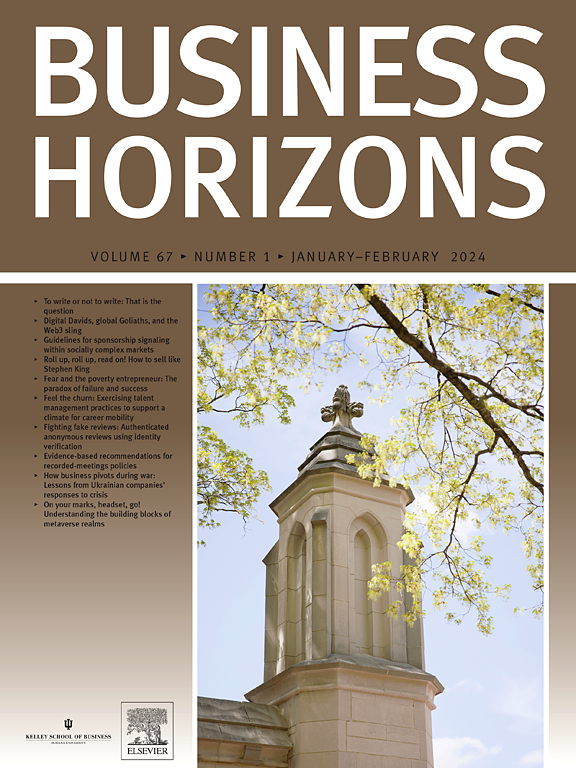Business survival strategies in a polycrisis: SME experiences from Beirut, Lebanon
IF 7
3区 管理学
Q1 BUSINESS
引用次数: 0
Abstract
Most existing literature on business and crisis frames a crisis as a singular event that a business must navigate to survive or thrive. What we do not know is how firms survive through a series of intersecting and overlapping crises (i.e., a polycrisis environment) and how their strategies differ when operating amid perpetual crises. In Lebanon, overlapping crises grounded in weak political institutions, economic instability, and disasters have profoundly impacted small and medium enterprises (SMEs). Beirut SMEs operate in a complex urban environment, where neighboring conflicts, urban insecurity, and sectarian divisions impact operations. These firms are often promoted in economic development discourses as engines of resilient livelihood creation, but do SMEs negotiate these conditions in productive ways for the community, and can a perpetual crisis operating mentality deliver positive societal or economic dividends? This article addresses these questions by developing a framework that conceptualizes SME strategies for perpetual crises that draws on 34 in-depth qualitative interviews with SME owners in Beirut. We found that SMEs use nuanced strategies to contend with multidimensional crises that are distinct from singular crisis approaches and discuss how urban crises may shape our understanding of SMEs as peace and development actors. We use these findings to advance theory on the role of SMEs in perpetual crisis and on how survival strategies in such settings can upend business resilience.
多重危机下的企业生存策略:来自黎巴嫩贝鲁特的中小企业经验
大多数关于商业和危机的现有文献都将危机定义为企业必须应对的单一事件,以生存或繁荣。我们不知道的是企业如何在一系列交叉和重叠的危机中生存下来(即,多危机环境),以及它们在永久危机中运作时的战略如何不同。在黎巴嫩,由于政治制度薄弱、经济不稳定和灾害造成的多重危机深刻地影响了中小企业。贝鲁特中小企业在复杂的城市环境中开展业务,周边冲突、城市不安全以及宗派分歧都会影响业务。在经济发展的话语中,这些公司经常被视为创造弹性生计的引擎,但中小企业是否以有效的方式为社区谈判这些条件?持久的危机经营心态能否带来积极的社会或经济红利?本文通过开发一个框架来解决这些问题,该框架将中小企业应对永久性危机的战略概念化,该框架借鉴了对贝鲁特中小企业所有者的34次深入定性访谈。我们发现,中小企业使用微妙的策略来应对不同于单一危机方法的多维危机,并讨论了城市危机如何影响我们对中小企业作为和平与发展行动者的理解。我们利用这些发现来推进关于中小企业在持续危机中的作用的理论,以及在这种情况下生存策略如何颠覆商业弹性。
本文章由计算机程序翻译,如有差异,请以英文原文为准。
求助全文
约1分钟内获得全文
求助全文
来源期刊

Business Horizons
BUSINESS-
CiteScore
17.70
自引率
5.40%
发文量
105
期刊介绍:
Business Horizons, the bimonthly journal of the Kelley School of Business at Indiana University, is dedicated to publishing original articles that appeal to both business academics and practitioners. Our editorial focus is on covering a diverse array of topics within the broader field of business, with a particular emphasis on identifying critical business issues and proposing practical solutions. Our goal is to inspire readers to approach business practices from new and innovative perspectives. Business Horizons occupies a distinctive position among business publications by offering articles that strike a balance between academic rigor and practical relevance. As such, our articles are grounded in scholarly research yet presented in a clear and accessible format, making them relevant to a broad audience within the business community.
 求助内容:
求助内容: 应助结果提醒方式:
应助结果提醒方式:


